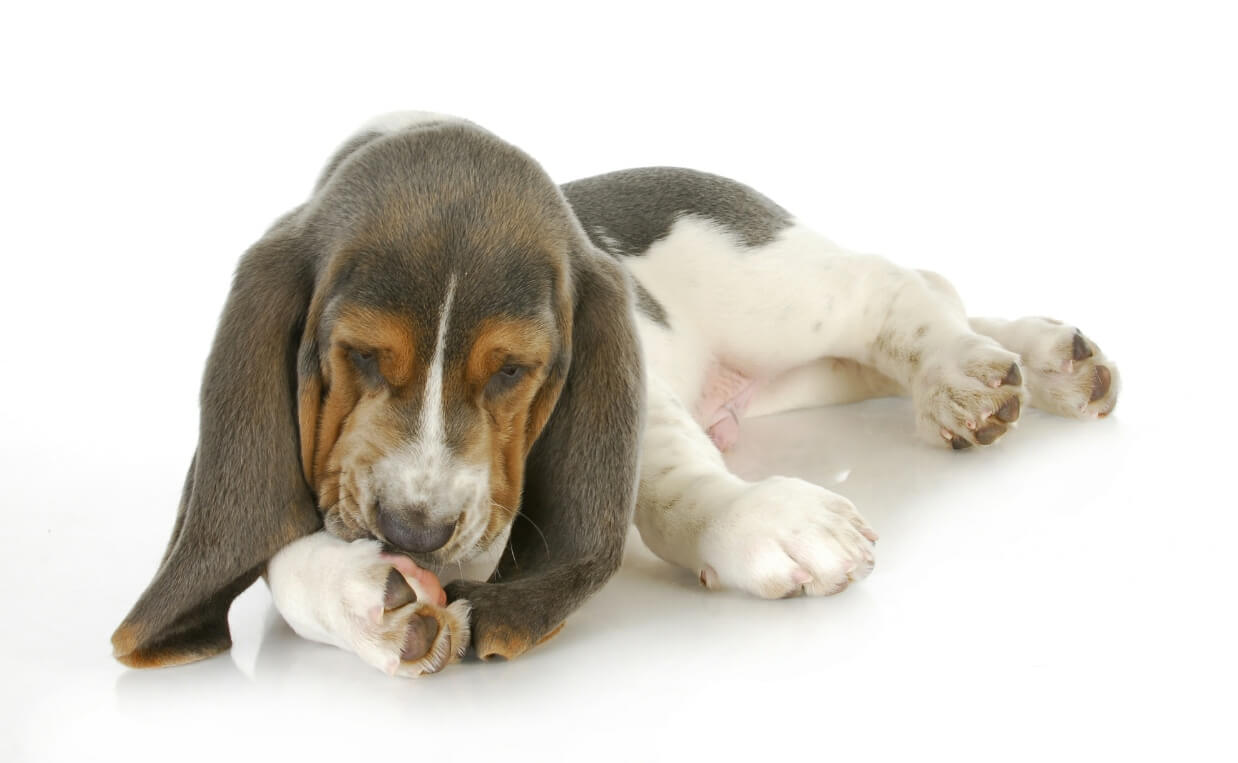
Excessive licking one or both paws is a common canine behavior. Some dogs even chew on their toes, which can be disconcerting.
Should dog parents be concerned?
Possibly. Persistent paw licking can simply be grooming, but if it comes on suddenly, persists for long periods of time or is accompanied with redness, swelling, odor, bleeding, limping or other possible signs of pain and infection, you should make an appointment to see your veterinarian. Be aware constant foot licking can cause a secondary infection due to the extra moisture from the saliva.
The good news is some causes of paw licking can be resolved with home treatment.
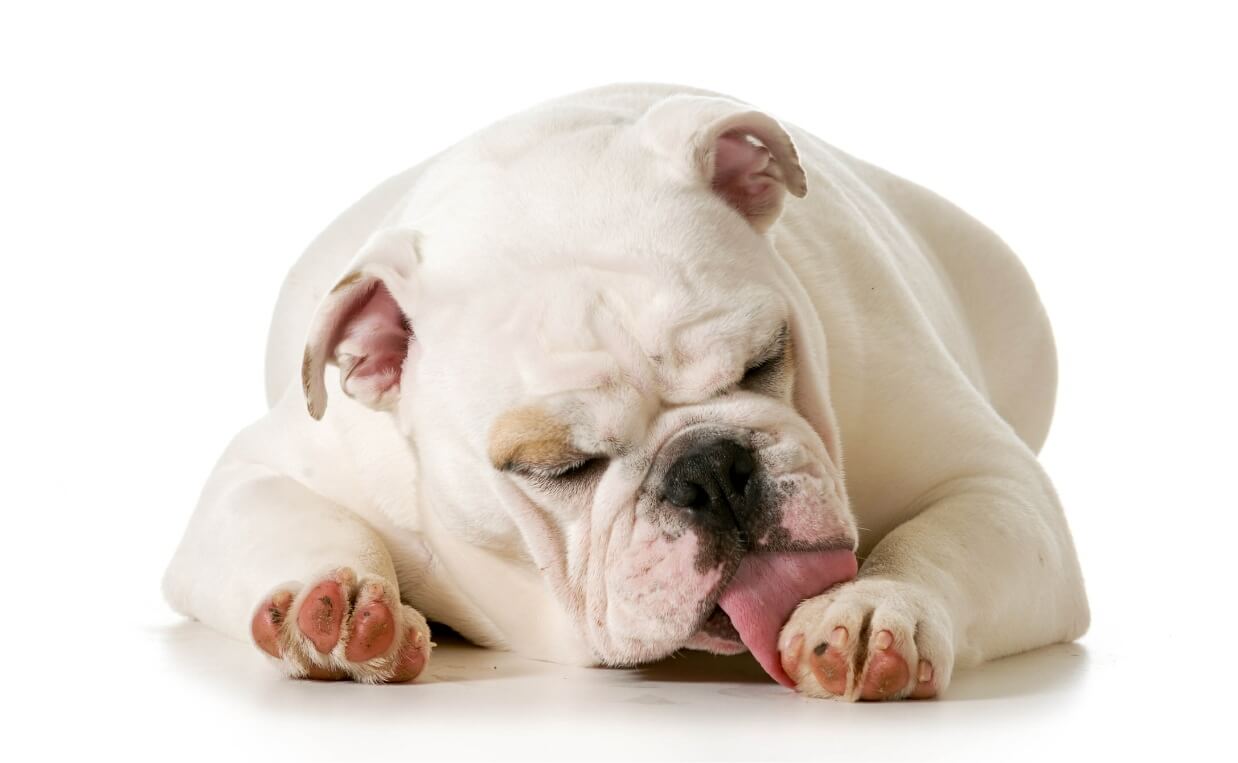
Possible Causes of Excessive Paw Licking
1. Allergies
-
Food allergies
Food allergies occur when the immune system of the dog reacts to protein in the ingested food. Common foods that cause allergies include:
- Beef
- Diary
- Wheat
- Egge
- Chicken
Symptoms of food allergies include:
- Itchy rash
- Paw licking
- Hot spots
- Diarrhea
- Vomiting
The reason dogs lick their paws is to relieve the itching caused by the allergic reaction.
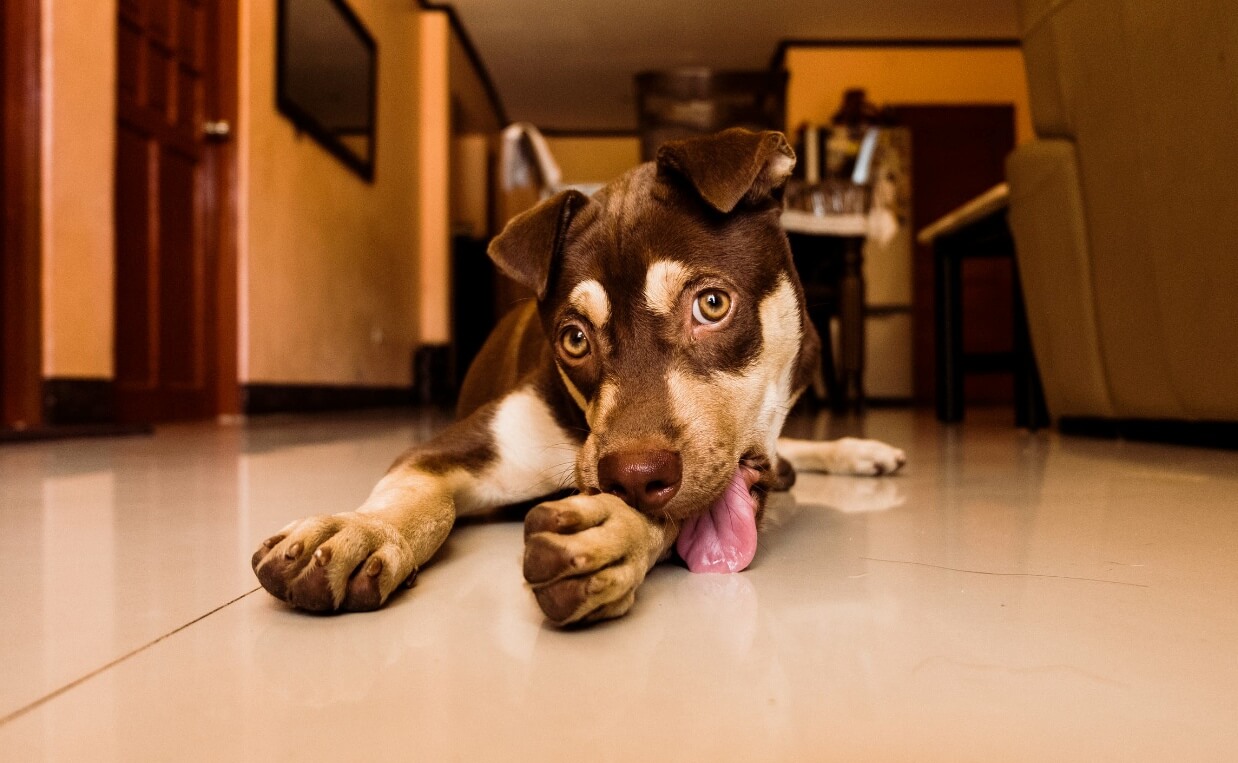
-
Environmental allergies
Increased ear-scratching and foot-licking are common responses to environmental allergies, such as:
- Grass
- Mold spores
- Dust mites
- Plant pollens
If you notice your dog is licking more frequently after being outside, he or she likely has an environmental allergy.
Symptoms of environmental allergies can include increased sneezing, running eyes, paw licking, itchy skin and rashes.
-
Flea allergies
Some dogs have an allergic reaction to fleas. The allergy is caused when the dog’s immune system overreactions to flea saliva. This condition is called flea allergy dermatitis (FAD). A flea allergy causes itchiness; dogs will typically scratch and lick in an attempt to soothe the itch.
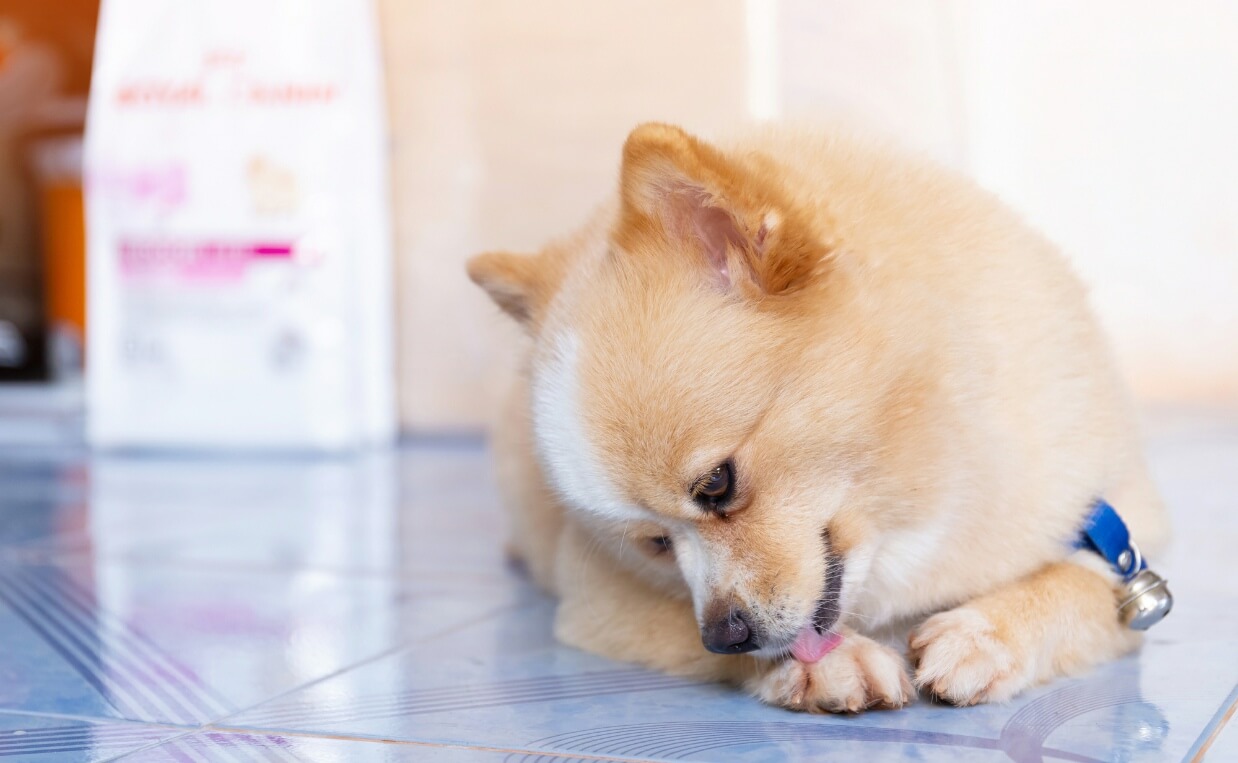
2. Dry Skin
Dry skin is a common condition in dogs. When a dog’s skin is dry, it will become irritated, cracked and flaky (dandruff). Dry skin can be caused by many things, such as excessive bathing which removes the dog’s natural oils, dry humidity, or by the allergies mentioned above. It’s important to follow a good grooming schedule to ensure your dog’s coat stays healthy.
3. Behavioral
-
Obsessive behavior
Some dogs have canine compulsive disorder, which is a form of obsessive compulsive disorder. Common compulsive behaviors include paw licking, toy or blanket sucking, tail licking and tail chasing.
-
Anxious behavior
Dogs, like people often seek ways to comfort themselves in times of stress. A stressful situation, such as a change in noises, routine, new pets or people cause cause your dog to seek stress relief.
If you suspect behavioral issues are causing your dog’s excessive paw licking, try to determine the cause of your dog’s stress and anxiety and use redirection and exercise to relieve it.
4. Boredom
Dogs who are bored may lick their paws excessively as a distraction or for something to do. While any dog may engage in this behavior, working breeds are more susceptible. Working breeds include:
- German Shepherd
- German Short-haired Pointer
- Golden Retriever
- Great Dane
- Irish Setter
- Labrador Retrievers
- Pointers
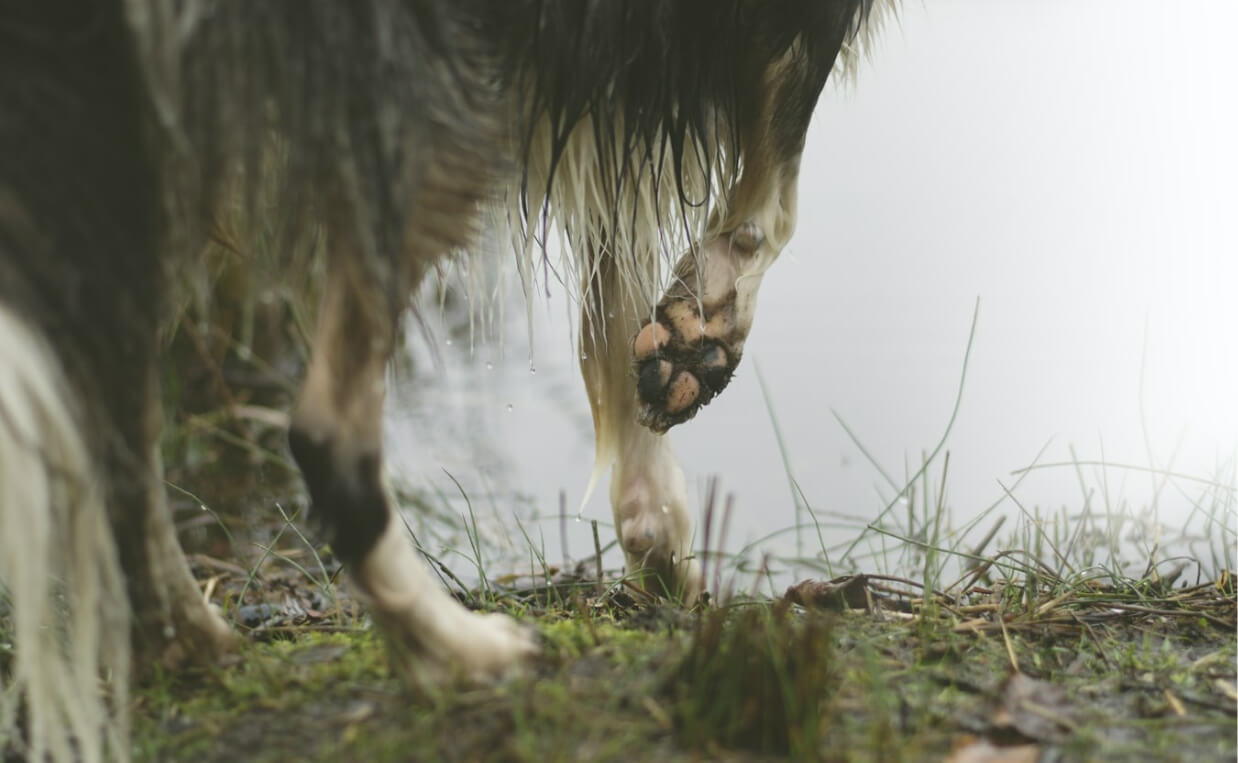
How to Help a Dog With Mild Itching
Mild itching now and then usually isn’t a sign of a serious condition. However, if your dog develops more serious symptoms, such as frequent or excessive licking, difficulty getting comfortable, restlessness from the itching, loss of appetite or depressed mood, call your veterinarian right away.
If your dog’s itchiness is occasional or mild, there are some home remedies you can try.
-
Colloidal oatmeal baths
Colloidal oatmeal baths are an age-old remedy for skin disturbances and itchiness. Colloidal oatmeal refers to oatmeal that’s been ground to a very fine powder. Colloidal oatmeal baths are an effective treatment for redness, swelling and itchiness. It can soothe your dog’s hot, uncomfortable paws. Since oatmeal is non-toxic, so you don’t have to worry it will harm your dog.
-
Coconut oil
Solidified coconut oil can soothe the discomfort associated with a variety of skin disorders, including itchy paws. Look for high-quality coconut oil with terms like “organic”, “unrefined”, or “virgin” on the label. To use coconut oil, massage it topically onto the dog’s paw.
-
Chamomile and green tea soaks
Chamomile and green tea soaks can help with inflamed skin. Try giving your dog a soak in a chamomile or green tea bath.
-
Baking soda
Baking soda can be blended with water to form a paste. Baking soda paste can help alleviate itching, redness and inflammation. To make a more moisturizing blend, add a little bit of high-quality coconut oil to the mixture. You can also add baking soda to a lukewarm bath to help your dog feel better.
-
A balanced diet
Feeding your dog a balanced diet with omega-3 fatty acids and healthy carbohydrates can help soothe and heal your dog from the inside out. Some dogs are allergic to chicken, beef, turkey, wheat or gluten ingredients. Finding the right food for your dog with your vet’s help can make a huge difference in the health of your pet.
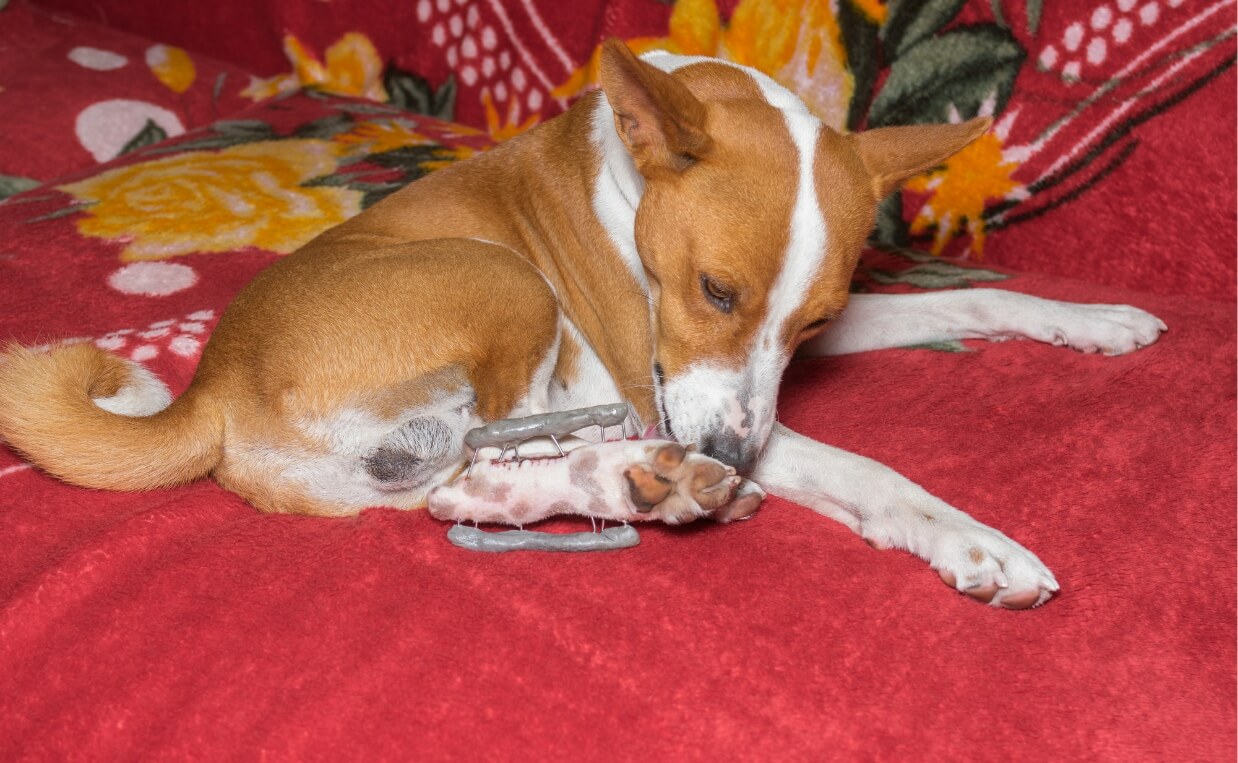
Special Concern Related to Paw Licking: Lick Granuloma
A lick granuloma (also called lick dermatitis) is a potential concern caused by excessive licking in dogs. Lick granulomas are caused by repeated licking, causing skin irritation. Lick granulomas are a stubborn disease, different from hot spots.
If you have any concerns about your dog’s paw licking, especially if it is sudden, excessive and persists for a long time, it is important you contact your veterinarian. You know your dog best and are in the best position to identify an abnormality. Paw licking can lead to a serious condition, so don’t hesitate to contact your vet if you suspect your dog has an underlying condition or home remedies are not effective.
Has your dog experienced excessive paw licking? Were you able to get the condition resolved? Please share your experience with the rest of the Canine Campus community by leaving a comment below…

 How to Recognize and Manage Arthritis in Dogs
How to Recognize and Manage Arthritis in Dogs Guide to Choosing the Best Dog Treats for Your Dog
Guide to Choosing the Best Dog Treats for Your Dog 7 Dangers of Obesity in Dogs
7 Dangers of Obesity in Dogs A Guide to Laser Therapy for Dogs
A Guide to Laser Therapy for Dogs Do Dogs Really Need Heartworm Prevention Medication?
Do Dogs Really Need Heartworm Prevention Medication?






Thank you so much that as helped me so much.
.
I’m glad we were able to be helpful. Thanks for stopping by the Canine Campus blog!
Was thankful for all the info on paw licking but I feel so hopeless. I have tried most of the baths, didn’t work. Put baby socks on, rubberized booties to walk and he pulls everything off. Finally got a collar and it depresses him but it’s the only way I can get him to go to sleep…..3 weeks ago when this started out of nowhere, went to get his nail trimmed thinking it was that, nope, his little left foot was a constant chew toy. Went to vet next day, she gave him an allegry shot which did nothing! Been back 2 times, nothing is working. He was put under 3-4 mths ago for teeth cleaning, he’s 10 lbs. and it took 2 days for anaesthesia to clear his system. Have I lost my pups mind? He just lays on sofa looking out window…..no change in diet but not eating b/c of all meds vet have given him. I am beside myself. I have no idea how to help my pup.
I’m so sorry to hear of your pup’s troubles. I suggest you continue to contact your veterinarian and let them know the treatments aren’t working. I hope your pup is feeling better by now. Thanks for stopping by the Canine Campus blog!
My mini Aussie is experiencing the same symptoms- lethargic, staring into space, excessively licking paws, going to a corner or next to a wall in the room and laying down.
She’s just not acting like she usually does and others in the family have noticed it.
I wish I could help her .
My dog also started the same behaviors you noted after a dental cleaning. My vet finally figured out he was having acid indigestion and put him on 10 mg of Pepcid 2x per day. It did help.
Glad to hear your pup is feeling better! Thanks for sharing your experience here with the Canine Campus community. We appreciate you visiting our blog and hope to see you back again soon!